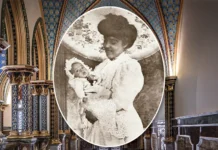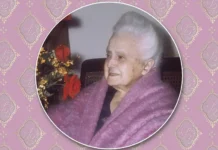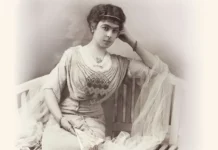Praying before statue of the Sacred Heart of Jesus, Dona Lucilia resembled the flame of a sanctuary lamp that burns before the Blessed Sacrament: lit only for God, oblivious to everything around it, as it triumphs over the darkness.
With the advancing years, Dona Lucilia was naturally obliged to curtail her domestic duties, little by little, as her strength waned. But she did not give way to inactivity; and she filled her free moments with her preferred occupation: prayer – that quiet company kept with the Sacred Heart of Jesus.
Contemplation and prayer
Under the merciful gaze of her beautiful statue, she spent the mornings in her room, tirelessly fingering her rosary beads, alternating this prayer with the recitation of her customary novenas and litanies, along with other prayers, usually taken from her favourite book of devotions – that of Goffiné1 – which had been her constant companion since her youth.
One of her favourite prayers was the Irresistible Novena to the Sacred Heart of Jesus, which she must have prayed more insistently in times of trial.
Dona Lucilia implored divine protection through yet another prayer, Psalm 91, which she copied out in her elegant script. These luminous verses, inspired by the Holy Spirit, she certainly prayed, firstly, with a view to the struggles of her “filhão”2 and the obstacles he faced.
Throughout the day, depending on the circumstances and the intentions for which she prayed, Dona Lucilia said her prayers in different rooms of the house: walking slowly up and down the corridor, seated in the dining room as she contemplated the sunset over the tree-lined Buenos Aires Square, in her son’s room, before the statues on the nightstand, or, most often, in the office, seated in the rocking chair which she moved almost imperceptibly, seemingly wrapped in a diaphanous cloud of serenity.
Whoever observed her at these moments could never say whether she interrupted her vocal prayers to meditate, or vice versa; for contemplation and prayer formed a whole in her spirit.
Witness of her requests and acts of adoration
With the advent of old age Dona Lucilia accustomed herself to praying late into the night before the alabaster image of the Sacred Heart of Jesus, which reigned over the main room of the apartment. When Dr. Plinio returned, after long hours of vigorous activity, he would find her there, often standing, with an erect posture despite her age, her lips very close to the Heart of Our Lord, often with her eyes closed and rosary in hand. She seemed to have just finished speaking with Jesus at that moment.
Depending on the intensity of her ardour when she formulated her intentions, she would reverently place the tips of her fine fingers on the divine feet or on the adorable hands of the Saviour. Anyone who saw her praying in this way – with such humility, and so fully convinced of being loved by Our Lord, afraid of not treating Him well enough or with the reverence due to Him – could not but be deeply moved.
How many petitions for her kin, how many considerations about life, of the consolations and the crosses of this earthly existence, and of the glories and tragedies of Christianity, she must she have brought to the Divine Redeemer!
Close to the Sacred Heart of Jesus, Dona Lucilia resembled, at times, the flame of a sanctuary lamp that burns before the Blessed Sacrament. It is lit only for God Our Lord, oblivious to everything around it, but above all, it does not burn out, or waver. It triumphs quietly over the darkness, undisturbed in its throne-like setting, in its holocaust, in the ruby-coloured receptacle of oil that it consumes.

Dona Lucilia prayed so much before the statue of the Sacred Heart of Jesus in that room, that it became linked in a mysterious way with something of her person. The feet, right knee and hands of this statue, lightly worn by her kisses, testified to the insistence of Dona Lucilia’s petitions and the intensity of her acts of worship.
Conversing with the Divine Redeemer
Immersed in prayer, she usually did not notice her son’s arrival, a circumstance to which her gradually diminishing hearing also contributed. Not wanting to interrupt her, he announced his presence by lightly touching her hand, to which Dona Lucilia responded with a discreet movement of her fingers, as if to say: “My son, I make such an absent gesture because I am in conversation with Our Lord, and before Him, anyone else is no one…” And she would remain in the same position of recollection, praying and praying…
But if her prayer was very prolonged, Dr. Plinio would try to convince her to retire. Dona Lucilia, seeking to gain a little more time, responded:
“Filhão, wait a bit, go ahead and arrange your things, and I will soon finish.”
Sometimes Dr. Plinio would silently approach from behind, and wrap his arms around her. Knowing that it was her son, Dona Lucilia did not manifest the least surprise, but turned around calmly, kissed him and exchanged a few words with him. When, on these occasions she would interrupt her prayers, it was beautiful to see how she moved from thoughts of the Infinite to the finite in a measured and orderly fashion, harmoniously and naturally.
After the chat, if Dona Lucilia made any mention of returning to prayer, Dr. Plinio would gently try to convince her to go to sleep.
Dr. João Paulo would sometimes wake up and go into the room to call Dona Lucilia. He would exclaim quite emphatically, opening his arms in his characteristic way:
“Ma’am, three in the morning… Ma’am!”
Unruffled, Dona Lucilia turned slightly toward her husband, making a small sign with her fingertips, indicating that she would go soon. To which he would retort:
“Oh no you won’t, you’ll keep on praying.”
Without answering, she tarried a little longer, finally concluding her prayer with a solemn Sign of the Cross. She would kiss the statue of the Sacred Heart one last time and then, satisfied, head to her room.
Taken, with slight
adaptations, from: Dona Lucilia.
Città del Vaticano-Nobleton: LEV;
Heralds of the Gospel, 2013, p.550-553
Notes
1 Manual do Cristão [A Manual for the Christian], by Fr. Leonardo Goffiné (1648-1719).
2 Filhão is the augmentative of filho – son, meaning, literally, “big son”. Dona Lucilia frequently used it as a term of endearment for Dr. Plinio, since he was small.







